Cash Flow Fight Club
Cash Flow. You love it. You want it! We’re all seeking it, but what’s the best way to generate it? Google Cash Flow and get instantly overwhelmed. With so much noise and marketing hype out there, how do you know which approach is the best for you? We’ve wrestled with massive amounts of research, opinions and experimentation trying to find the best methods. Now we’re on a mission to find the best methods and give you all the dirty details - Fight Club style! In our signature Fight Club matchups, we bring together the heavyweights of business and investing to debate the risks, rewards and the inside scoop on the best ways to generate life-changing cash flow that can put you on the path to financial freedom. And after battling it out in the arena over 3 rounds, we crown the Champion. We alternate Fight Club matchups by going In the Champion’s Corner, where we’ll discover what it takes to forge a champion. Mindset, high performance habits, best-in-class behaviors and more of what it takes to be successful – in your finances and in life. So whether it’s passive income, real estate, side hustles or cash-flowing business ventures, we’re bringing you all the details in the most informative and entertaining show on the airwaves. Join us to see who’ll reign supreme! Who will take home the title of Cash Flow Fight Club Champion. And the 1st rule of the Cash Flow Fight Club – hit subscribe and don’t miss even 1 battle among the titans of Cash Flow. It’s going to be epic!
Episodes
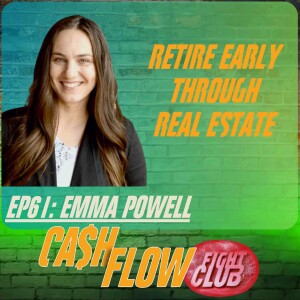
Wednesday Sep 11, 2024
Wednesday Sep 11, 2024
In this episode of the Cash Flow Fight Club podcast, hosts Mike and Ligia Deaton interview Emma Powell, a seasoned real estate investor.
They discuss market cycles, the importance of preparedness, and resilience in both high and low markets. Emma shares her journey from a photography business to real estate investing, emphasizing diversification, partnerships, and the critical role of cash flow versus yield.
She also provides insights into homeschooling, mentorship, and navigating interpersonal conflicts within business partnerships. The episode offers valuable lessons on mindset, managing investments, and the intricate balance of personal and professional life.
00:00 Navigating Market Downturns: Strategies for Real Estate Investors
01:21 Introduction to the Cashflow Fight Club Podcast
01:56 Meet Emma Powell: From Early Retirement Dreams to Real Estate Success
02:56 The Journey Begins: From Photography to Real Estate
05:15 Learning the Ropes: Education and Early Investments
08:17 Building a Real Estate Empire: Strategies and Challenges
12:47 Balancing Family and Business: Homeschooling and Real Estate
20:32 Getting Started in Real Estate: Tips and Mentorship
28:48 Navigating Real Estate Challenges
29:38 Creative Financing Solutions
30:51 Off-Market Deals and COVID Impact
32:12 Scaling Up: From Small to Large Properties
34:49 The Importance of Partnerships
43:15 Communication and Conflict Resolution
49:08 Final Thoughts and Gratitude
If you're looking to understand how to get started in real estate, build up for retirement or up your own real estate game, check out what Emma's experience has to offer.
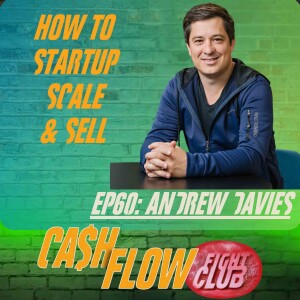
Wednesday Sep 04, 2024
Wednesday Sep 04, 2024
In this episode of the Cashflow Fight Club Podcast Champion's Corner edition, hosts Mike and Ligia Deaton talk with Andrew Davies, a successful entrepreneur with a broad career spanning various business ventures. Davies shares insights on his early entrepreneurial days, starting with a Deloitte scholarship, founding multiple businesses including a top-end women's fashion label, and moving on to his significant role at IDEO, a company focusing on personalization and algorithmic content classification. He emphasizes critical themes such as the importance of mindset mastery, resilience, and listening to the market. He also discusses how startups should focus their strategies including having a coherent customer vision, and shares his pivot from an agency model to a B2B tech solution that ultimately led to a successful acquisition. The conversation also highlights the value of having supportive partners and networks in the entrepreneurial journey.
00:00 Welcome to the Cashflow Fight Club Podcast
00:54 Introducing Andrew Davies
01:06 Early Days of Entrepreneurship
01:36 The Deloitte Scholarship Experience
02:35 First Business Ventures
03:56 Challenges and Lessons Learned
06:45 Building Through Digital
13:29 The Power of a Co-Founder
16:56 Transition to IDEO
19:18 Algorithmic Personalization and Pivot to B2B
20:40 Challenges and Strategies in B2B Market
23:33 Navigating Growth and Acquisition
32:15 Coaching and Mentoring Entrepreneurs
37:42 Final Thoughts and Gratitude
Andrew is wealth of great information for founders and entrepreneurs.
Connect with him on LinkedIn: @andjdavies
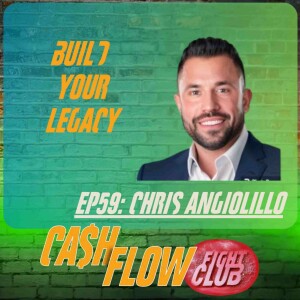
Wednesday Aug 28, 2024
Wednesday Aug 28, 2024
In this episode of the Cashflow Fight Club Podcast's Champion's Corner Edition, hosts Mike and Ligia Deaton interview Chris Angiolillo.
Chris, based in Boston, balances running 11 Dunkin' franchises and investing in real estate, alongside cherishing his family life. He shares his journey from that of a self-motivated individual to prioritizing family goals and legacy building. Chris discusses the unique dynamics of family businesses, the importance of mentorship, and the evolving landscape of franchising, offering valuable insights into personal and professional growth. This conversation highlights the significance of mindset, the journey through various entrepreneurial ventures, and the pursuit of balance and success.
00:00 Introduction and Personal Journey01:10 Welcome to the Cashflow Fight Club Podcast02:03 Meet Chris Angelello03:26 Chris's Background and Family Business09:32 Franchise Life and Duncan's Evolution19:41 Real Estate Ventures and Multifamily Investments24:19 Reflecting on COVID's Impact24:34 Business Resilience in Tough Times25:13 Learning from Personal Experiences27:27 The Importance of Mindset28:50 Mentorship and Personal Growth30:00 Family and Business Dynamics39:37 Gratitude and Acknowledgements45:23 Closing Thoughts and Contact Information
Chris has an incredible outlook on life and shares many insights on how to run a franchise, navigate family businesses, and evolve as life and family do.
You'll love this episode.
Connect with Chris: https://www.linkedin.com/in/christopherangiolillo/ Partner with Chris: https://www.signiferventures.com/
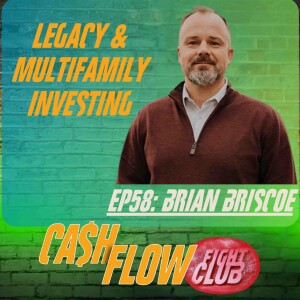
Wednesday Aug 21, 2024
Wednesday Aug 21, 2024
In this episode of the Cashflow Fight Club podcast, we're joined by Brian Briscoe, a retired Marine and the founder and CEO of Streamline Capital. Brian shares his journey from a career in the military to becoming a multifamily real estate investor, owning over 1,500 apartment units and successfully exiting nine properties since 2018. He discusses the importance of having a strong 'why', the challenges and rewards of syndication, and his strategies for scaling in the multifamily space. We also dive into his coaching initiatives through the Tribe of Titans, where he mentors aspiring syndicators. Tune in to hear Brian's valuable insights and tips for succeeding in the world of multifamily investing.
00:00 Introduction to Brian Briscoe01:21 Brian's Early Life and Education03:03 First Steps into Real Estate04:58 Scaling Up: From Single Family to Multifamily15:27 The Role of Partnerships in Real Estate22:16 Current Strategies and Market Focus25:27 Market Conditions and Predictions for 202425:48 Challenges in the Rental Market27:30 Investment Strategies and Opportunities29:19 Acquisition Strategy and Property Classes33:02 Coaching and Mentorship Journey35:13 Client Success Stories and Program Insights39:21 The Importance of Market Analysis43:16 Conservative Underwriting and Risk Management46:16 Gratitude and Closing Thoughts
Brian has unique investing philosophies that have allowed him to build lasting wealth and weather ups and downs in the market.
RESOURCES MENTIONEDBrian Briscoe on LinkedIn: https://www.linkedin.com/in/brian-briscoe-ut/ Streamline Capital Group: https://www.streamlinecapitalgroup.com/ Tribe of Titans Mentorship: https://www.thetribeoftitans.com/
Please subscribe to the show and leave a review if you found value out of this or other episodes.
Thank you!
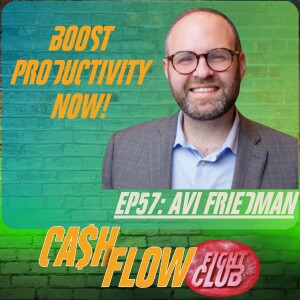
Wednesday Aug 14, 2024
Wednesday Aug 14, 2024
Master Time Management and Overcome Procrastination with Avi Friedman#efficiency #timemanagement #productivity #podcast #cashflowfightclub
In this episode of the Cashflow Fight Club podcast's In the Champion's Corner edition, hosts Mike and Ligia Deaton welcome time management coach Avi Friedman. Avi shares his journey from being a marriage and family therapist overwhelmed by life's demands to becoming a coach who helps business owners use their time more effectively. The discussion delves into mindset mastery, high-performance habits, and practical tips for overcoming procrastination. Listeners will gain insights into building effective time management systems, setting focused work periods, and implementing accountability strategies.
00:00 Welcome to the Cashflow Fight Club Podcast00:57 Introducing Avi Friedman: Time Management Coach01:45 Avi's Journey to Time Management Mastery03:24 The Importance of Systems and Organization07:51 Common Challenges in Time Management and Procrastination11:15 Avi's Coaching Approach and Client Success Stories15:50 The Customized Coaching Process23:03 Empowering Clients to Find Their Own Solutions23:51 Breaking Down Actions to Overcome Procrastination24:16 Dealing with Fear and Uncomfortable Tasks26:31 Strategies for Accountability and Productivity27:17 The Importance of Focus and Time Management33:39 Practical Tips to Overcome Procrastination42:21 Conclusion and Contact Information
### Episode Highlights:
**[00:02:00] Avi’s Journey from Therapist to Time Management Coach** Avi Friedman began his career as a marriage and family therapist. However, juggling multiple responsibilities led him to feel overwhelmed, which eventually inspired his interest in time management. After a personal transformation, Avi decided to help others who struggle with organization and efficiency.
**[00:05:00] Building Systems That Work** One of Avi’s key strategies is developing systems that help manage time and tasks effectively. He shares how creating a system for routine tasks, like paying bills and managing projects, can relieve the mental load and free up time for more important activities.
**[00:13:17] Addressing Common Time Management Problems** Avi discusses the typical issues he encounters with clients, such as time management and procrastination. He shares examples of how even simple changes, like setting aside specific time slots for business development, can make a significant difference.
**[00:26:06] Techniques for Overcoming Fear and Procrastination** Fear of failure, rejection, or even success can lead to procrastination. Avi explains how breaking down tasks into smaller, manageable steps and setting time limits can help overcome these fears and increase productivity.
**[00:35:09] Staying Focused in a Distracting World** Focus is key to productivity, but distractions are everywhere. Avi offers practical advice, such as setting a timer for focused work sessions and minimizing notifications, to help stay on track and maximize efficiency.
---
Resources Mentioned:- Visit Avi: https://managedminds.co/ - Connect on LinkedIn: https://www.linkedin.com/in/managedminds/ - Focusmate- Getting Things Done by David Allen- Eat That Frog by Brian Tracy- Atomic Habits by James Clear
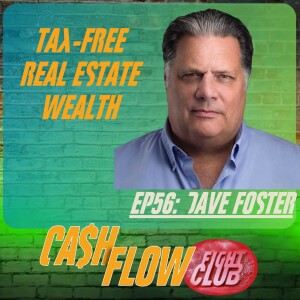
Wednesday Aug 07, 2024
Wednesday Aug 07, 2024
The wealthy know how to invest in real estate and not pay taxes - EVER!#investing #podcast #realestate #1031exchange #taxes #cashflowfightclub
In this episode of the Cashflow Fight Club podcast, hosts welcome Dave Foster, founder of The 1031 Investor and author of 'Lifetime Tax Free Wealth.'
The discussion centers on the powerful benefits of the 1031 Exchange, a section of the tax code that allows real estate investors to defer payment of capital gains taxes when selling a property and reinvesting the proceeds into a new property.
Dave shares personal stories, practical advice, and strategies on how real estate investors can utilize 1031 Exchanges to build wealth over time, avoid taxes, and achieve their dreams.
The episode also covers the basics of 1031 Exchanges, the critical role of the Qualified Intermediary, the significance of proper timing, and case studies illustrating the potential for tax deferral and wealth generation. Tune in to learn how to make the most of your real estate investments!
00:00 Introduction to 1031 Exchange00:56 Meet Dave Foster: Real Estate Expert01:35 Dave's Journey into Real Estate03:19 Understanding the 1031 Exchange05:02 Rules and Limitations of 1031 Exchange09:42 Timing and Identification in 1031 Exchange19:06 The Role of Qualified Intermediaries21:11 The Importance of a Good QI22:26 Understanding Case Law and 1031 Nuances23:02 Strategies for Real Estate Investing24:44 Retirement and Tax Strategies31:12 Combining 1031 with Retirement Accounts32:27 Getting Started with 1031 Exchanges37:32 Educational Resources and Final Thoughts
Dave brings a career’s worth and decades of experience in how to leverage the tax code and real estate to your advantage. No matter where you are in your journey, you’ll come away with a better understanding of and be inspired by the power of the 1031 Exchange
Resources mentioned:Dave’s book: Lifetime Tax-Free WealthThe 1031 Investor: https://www.the1031investor.com/
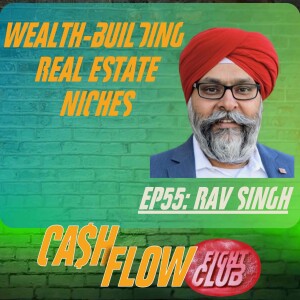
Wednesday Jul 31, 2024
Wednesday Jul 31, 2024
In this riveting episode of the Cash Flow Fight Club podcast's In the Champion's Corner edition, hosts Mike Deaton and Ligia chat with real estate and hospitality investment expert Rav Singh.
With a background that spans graphic design, gas stations, and hotel brokerage, Rav shares his immigrant story from India to the Midwest, and his journey to becoming a hospitality division leader at KW Commercial.
The discussion explores alternative investment types, mindset mastery, the importance of education, weathering economic downturns, and navigating hospitality investments post-pandemic.
Tune in to uncover the intricacies of multifamily vs. hospitality assets, the significance of specialized real estate knowledge, and how to maximize investment opportunities.
00:00 Introduction to the Podcast
01:01 Guest Introduction: Rav Singh
01:09 Rav Singh's Background and Journey
02:53 Transition to Real Estate
12:12 Navigating the 2008 Financial Crisis
15:25 The Value of Education and Certification
22:01 Entering the Hospitality Sector
22:13 Introduction to Hospitality Investing
22:36 Specialization in Hospitality
23:11 Entering the Hospitality Industry
24:32 Differences Between Hospitality and Multifamily
28:43 Key Factors in Hospitality Investment
38:43 Fund Management and Investment Strategy
46:53 Impact of COVID-19 on Hospitality
48:51 Conclusion and Contact Information
Discover how you can profit from niche real estate investments.
Let's go!
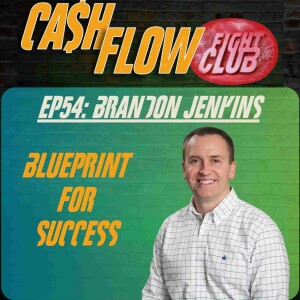
Wednesday Jul 24, 2024
Wednesday Jul 24, 2024
In this episode of the Cash Flow Fight Club podcast, hosts Mike Deaton and Ligia chat with Brandon Jenkins, a professor at the U.S. Naval War College and the founder of Tier One Coaching.
Brandon shares his journey, emphasizing the importance of team dynamics and leadership in the military and beyond. He discusses the blueprint process he uses in his coaching practice to help individuals gain clarity in their careers and lives.
Brandon highlights the significance of a growth mindset, humility, and introspection, providing insights into tools and books that have influenced his personal and professional development. The episode is rich with practical advice on navigating transitions and aligning one's life with core values.
00:00 Navigating Career Transitions
00:24 Introducing the Blueprint Process
01:01 Escaping the Job Trap
02:20 Welcome to the Cashflow Fight Club Podcast
02:55 Meet Brandon Jenkins
04:03 The Importance of Team Dynamics in the Military
10:00 Transitioning to Civilian Life and Coaching
17:08 Understanding the Blueprint Process
18:49 Client Satisfaction and Blueprint Process
20:25 Leadership Paradigms and Coaching Mindset
23:49 Traits for Success in the Blueprint Process
26:40 Mindfulness and Personal Practices
28:46 Books and Reflection for Personal Growth
34:04 Applying Principles and Critical Reasoning
37:56 Gratitude and Closing Remarks
Join us!
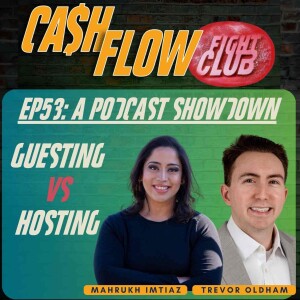
Wednesday Jul 17, 2024
Wednesday Jul 17, 2024
The Ultimate Showdown: Hosting vs. Guesting on Podcasts
In this episode of the Cashflow Fight Club podcast, we dive into an exciting debate on whether it's more beneficial to host your own podcast or be a guest on others.
Representing the hosting side is Mahrukh 'the spicy queen of content coaching' Imtiaz, who has successfully leveraged her podcast 'Spicy Chai' for personal growth and revenue.
On the guesting side, we have Trevor 'the podcast guesting guru' Oldham from Podcasting You, who has booked thousands of podcast interviews and champions guest appearances for brand exposure.
The discussion covers key aspects like reach and exposure, time and resource commitment, and the benefits each approach offers. Tune in to gain valuable insights and decide which strategy suits you best.
00:00 The Best Benefit of Having Your Own Podcast00:36 Generating Leads and Networking Through Podcasting01:19 Debate: Hosting vs. Guesting on Podcasts01:33 Introducing the Contenders03:30 Mahrukh's Journey into Podcasting06:42 Trevor's Experience in the Podcasting Space09:51 Round One: Reach and Exposure18:26 Round Two: Time, Effort, and Resources26:50 A Human Moment in Podcasting27:11 Cost and Effort in Podcasting27:42 Essential Podcasting Equipment30:23 The Value of Podcast Documentation35:24 Benefits of Being a Podcast Guest42:03 Hosting Your Own Podcast49:32 Final Thoughts and Gratitude
Resources:
Mahrukh on LI: https://www.linkedin.com/in/mahrukh-imtiaz/
Spicy Chai Podcast
Trevor Oldham on LI: https://www.linkedin.com/in/trevorjoldham/
Podcasting You
Let's get ready to RUMBLLLLLLLLLE!
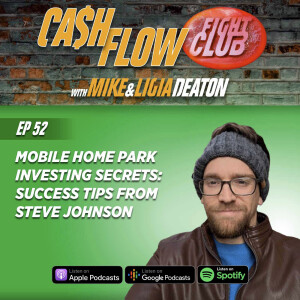
Wednesday Jul 10, 2024
Wednesday Jul 10, 2024
Discover the secrets of mobile home park investing as we sit down with Steve Johnson, owner of 14 mobile home parks and expert note investor. Steve shares his journey from theater to real estate, offering valuable insights into the world of mobile home park investments, passive income strategies, and the power of leveraging virtual assistants for business growth.
Whether you're looking to diversify your portfolio or learn about unconventional real estate opportunities, this episode is a must-listen. Tune in now and expand your investment horizons!
Here are some power takeaways from today’s conversation:
02:16 - Steve's transition from theater to real estate investing
07:46 - The advantages of mobile home park investments
11:08 - Risks and red flags in mobile home park investing
23:47 - Passive income through note investing
45:01 - Leveraging virtual assistants for business growth
48:53 - The importance of finding the right partners in real estate
Episode Highlights:
[07:46] The Advantages of Mobile Home Park Investments
Mobile home parks have a recession-resistant nature and role in providing affordable housing without government subsidies. Steve emphasizes the potential for value-add projects in older parks and the benefits of economies of scale when investing in larger parks with 70+ lots. He also points out the dual income streams from lot rent and home payments, as well as the reduced competition in certain markets, particularly in the Midwest. Steve discusses the opportunity to improve parks and increase value through infrastructure upgrades, ultimately leading to the potential for higher returns compared to traditional real estate investments.
[11:08] Risks and Red Flags in Mobile Home Park Investing
Steve emphasizes the challenges posed by aging infrastructure in older parks, particularly underground utilities and the impact of harsh climates in northern regions. He warns about the significant costs associated with major upgrades, such as replumbing entire parks. He also highlights the importance of understanding local market dynamics and the potential difficulties in implementing new policies with existing tenants. Steve stresses the critical need for thorough due diligence to identify these issues before investing in a mobile home park.
[23:47] Passive Income Through Note Investing
Steve describes how investors can purchase notes on mobile homes within parks, typically starting at around $25,000. These investments offer returns between 8-12% over a 7-year term. Steve highlights that this method allows passive investors to benefit from the mobile home park's income stream without direct involvement in park operations. These are secure investments as they're backed by both the mobile home payments and the park itself, providing a safety net for investors even in worst-case scenarios.
[48:53] Finding the Right Partners in Real Estate
Steve emphasizes how having the right partners allows for complementary skills and knowledge, especially when dealing with the many moving parts of commercial real estate. He describes how he found his current partners through networking and building relationships over time. Going through challenges together reveals each partner's character and ability to handle crises.
Resources Mentioned:
www.linkedin.com/connect-with-steve-johnson
www.realestick.com








